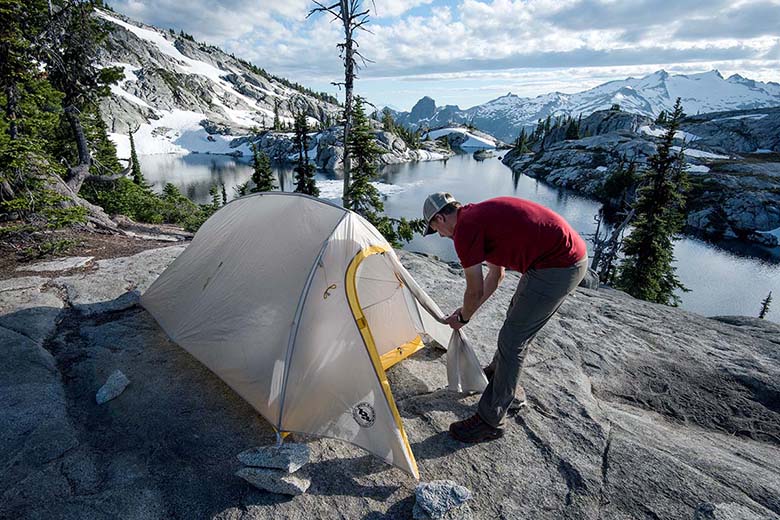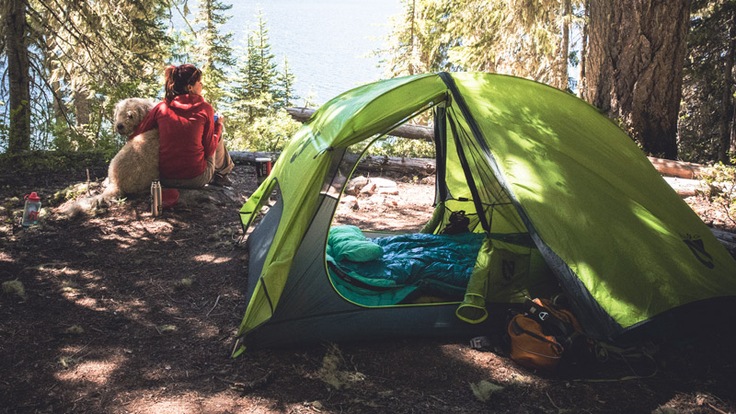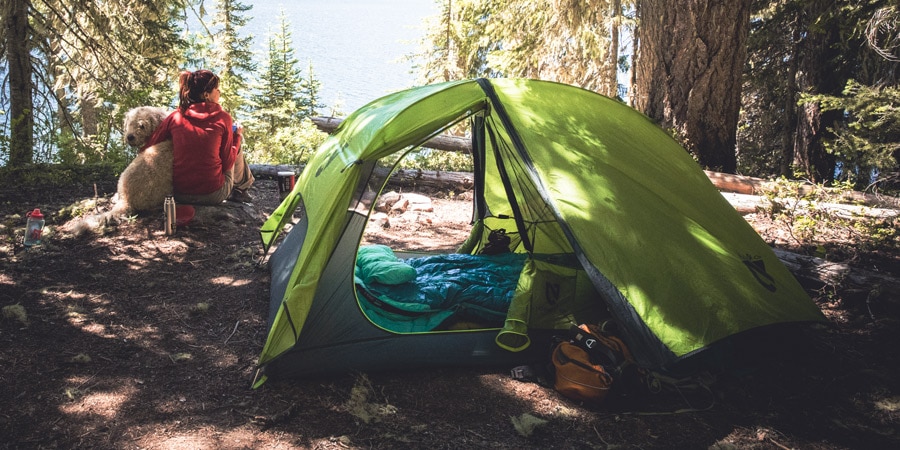When choosing a backpacking tent, consider its weight, size, weather resistance, and durability. The right tent will provide comfort and protection during your outdoor adventures.
Backpacking tents are essential gear for any outdoor enthusiast. Whether you’re embarking on a multi-day trek through the wilderness or planning a weekend camping trip, selecting the right tent is crucial for a successful and enjoyable experience. With a wide array of options available on the market, finding the perfect backpacking tent can be overwhelming.
This guide will help you navigate through the key factors to consider when choosing a backpacking tent, ensuring that you make an informed decision that suits your specific needs and preferences. From ultralight solo shelters to spacious multi-person tents, there are various considerations to keep in mind to ensure you select the ideal backpacking tent for your adventures.

Credit: www.switchbacktravel.com
Table of Contents
Importance Of A Quality Backpacking Tent
Choosing the right backpacking tent is essential for any outdoor enthusiast. A good backpacking tent will provide shelter, protection, and comfort in any weather conditions. It is important to invest in a quality backpacking tent that will last for years and provide reliable protection from the elements.
Protection From The Elements
One of the most important factors to consider when choosing a backpacking tent is its ability to protect you from the elements. A quality backpacking tent will be made from durable materials that can withstand wind, rain, and snow. It should also have a waterproof coating to prevent leaks and keep you dry.
Look for a tent that has a sturdy frame and can be securely staked down to prevent it from collapsing in high winds. A tent with a low profile will also be less likely to be damaged by wind and will offer better protection against the elements.
Comfort And Livability
While protection from the elements is important, a backpacking tent should also be comfortable and livable. Look for a tent that has enough space for you and your gear, with a vestibule for storing your boots and backpack. A tent with a high ceiling will also provide more headroom and make it easier to move around inside.
Consider the weight and size of the tent, as well as how easy it is to set up and take down. A tent that is too heavy or difficult to set up will be a burden on long backpacking trips. Look for a tent with good ventilation to prevent condensation and keep the interior comfortable.
Conclusion
Choosing a quality backpacking tent is essential for any outdoor adventure. A tent that provides reliable protection from the elements and is comfortable and livable will ensure a successful and enjoyable trip. Consider your needs and the conditions you will be facing when choosing a backpacking tent, and invest in a quality tent that will last for years to come.
Understanding Tent Capacity
When it comes to choosing a backpacking tent, understanding tent capacity is crucial. The right tent size can significantly impact your comfort and overall experience during your outdoor adventures. Let’s delve into the considerations for tent size and the importance of interior space.
Considerations For Tent Size
When selecting a backpacking tent, consider the number of people who will be using it. Ensure the tent’s capacity matches the number of occupants. Additionally, think about the gear you’ll need to store inside the tent. Look for a tent with vestibules or adequate space to accommodate your belongings.
Importance Of Interior Space
The interior space of a tent is essential for providing a comfortable shelter. It’s crucial to have enough room for sleeping, sitting, and moving around. Prioritize tents that offer ample headroom and a layout that allows for organized storage of gear and personal items.
Key Features To Look For
When choosing a backpacking tent, it’s crucial to consider key features that will ensure comfort, protection, and convenience during your outdoor adventures. From weight and packability to weather resistance and durability, each feature plays a significant role in the overall performance of your tent. Additionally, proper ventilation and condensation management are essential for a comfortable and enjoyable camping experience. Let’s delve into the key features to look for when selecting a backpacking tent.
Weight And Packability
The weight and packability of a backpacking tent are critical considerations, especially for long treks and extended trips. Opt for a lightweight tent that can be easily packed and carried in your backpack. Look for compact designs that minimize bulk and weight without compromising on durability and space.
Weather Resistance And Durability
Weather resistance and durability are paramount for a backpacking tent, as it must withstand various environmental conditions. Ensure that the tent is constructed from durable, waterproof materials to provide reliable protection against rain, wind, and other elements. Reinforced seams, sturdy poles, and a robust rainfly are essential components for enhanced durability and weather resistance.
Ventilation And Condensation Management
Proper ventilation and condensation management are vital for maintaining a comfortable interior environment within your backpacking tent. Look for tents with adjustable vents, mesh panels, and strategic airflow designs to promote air circulation and minimize condensation buildup. A well-ventilated tent helps prevent moisture accumulation, enhancing overall comfort during your outdoor escapades.
Tent Design And Style
Choosing a backpacking tent involves considering important factors such as weight, size, and weather resistance. Look for a design that offers a good balance of durability and weight, with a style that suits your specific camping needs. Consider factors like the number of doors and vestibules, and the shape of the tent for added comfort and convenience.
Choosing the right backpacking tent is crucial for a comfortable and enjoyable outdoor experience. One of the most important factors to consider is the tent’s design and style. This includes freestanding vs. non-freestanding tents and single-wall vs. double-wall tents.Freestanding Vs. Non-freestanding Tents
Freestanding tents are designed to stand on their own without the need for stakes or guylines. They are easier to set up and can be moved around once they are assembled. Non-freestanding tents, on the other hand, require stakes or guylines to be set up properly. They are generally lighter in weight than freestanding tents and are ideal for backpackers who need to save space and weight.Single-wall Vs. Double-wall Tents
Single-wall tents have a single layer of fabric that serves as both the tent body and rainfly. They are lighter in weight and easier to set up than double-wall tents. However, they can be less breathable and more prone to condensation. Double-wall tents have two layers of fabric – an inner tent body and an outer rainfly. They are more breathable and less prone to condensation, but they are heavier and require more time to set up. When choosing a backpacking tent, consider your specific needs and preferences. If weight is a concern, a non-freestanding or single-wall tent may be the best option. If you prioritize comfort and convenience, a freestanding or double-wall tent may be more suitable.Materials And Construction
When it comes to choosing a backpacking tent, the materials and construction play a crucial role in determining its durability, weight, and weather resistance. Understanding the different types of tent fabrics and pole materials is essential for making an informed decision. Let’s delve into the key considerations for materials and construction when selecting a backpacking tent.
Types Of Tent Fabrics
The choice of tent fabric is pivotal in determining the tent’s durability and weather resistance. Here are some common types of tent fabrics:
- Nylon: Known for its lightweight and water-resistant properties, making it ideal for backpacking tents.
- Polyester: Offers excellent UV resistance and is less prone to stretching when wet.
- Cuben Fiber: Renowned for its exceptional strength-to-weight ratio and waterproof characteristics.
- Silnylon: Blends the benefits of silicone and nylon, providing waterproofing and durability.
Pole Materials And Configuration
Pole materials and their configuration significantly impact a tent’s stability and weight. Here are the primary pole materials and their characteristics:
- Aluminum: Offers a balance between strength and weight, making it ideal for backpacking tents.
- Fiberglass: Provides affordability but tends to be heavier and less durable compared to aluminum.
- Carbon Fiber: Known for its lightweight and excellent strength, but comes at a higher cost.
Seasonal Considerations
When choosing a backpacking tent, considering the seasonal aspects is crucial to ensure comfort and safety during your outdoor adventures.
Choosing The Right Tent For The Season
Different seasons call for different tent features.
- Summer: Look for tents with ample ventilation and mesh panels.
- Winter: Opt for tents with sturdy construction to withstand snow and wind.
- Three-Season: Versatile tents suitable for spring, summer, and fall.
Adaptable Features For Different Conditions
Having a tent with adaptable features can enhance your camping experience.
- Rainfly: Provides protection from rain and can be adjusted based on weather conditions.
- Ventilation: Adjustable vents help regulate temperature inside the tent.
- Inner Mesh: Keeps bugs out in warmer seasons while providing airflow.
- Removable Footprint: Adds extra protection and can be left behind for weight reduction.
Budget-friendly Options
When choosing a backpacking tent, budget-friendly options can be a great way to save money while still getting a quality product.
Balancing Cost And Quality
Consider factors like weight, durability, and weather resistance when balancing cost and quality for a backpacking tent.
Researching Affordable Brands
Look for reputable brands known for producing affordable yet reliable backpacking tents.

Credit: www.rei.com
Final Tips For Selection
Looking for a backpacking tent? Consider the weight, size, weather resistance, and ease of setup. Opt for a durable tent with good ventilation and enough space for your needs. Additionally, choose a reputable brand with positive customer reviews for a reliable purchase.
Seeking User Reviews
Reading user reviews can provide valuable insights into the actual performance of a tent.
Look for real-world experiences shared by fellow backpackers to gauge the durability and reliability of the tent.
Considering Warranty And Customer Support
Check the warranty details to ensure your purchase is protected against any defects or issues.
Choose a brand that offers responsive customer support for any inquiries or assistance needed.

Credit: www.rei.com
Frequently Asked Questions
What Kind Of Tent Is Best For Backpacking?
The best tent for backpacking is a lightweight, durable, and waterproof tent with good ventilation. It should be easy to set up and pack down, providing enough space for sleeping and gear storage. Consider a freestanding tent for versatility in different terrains.
Is A 4 Pound Tent Too Heavy For Backpacking?
A 4-pound tent may be too heavy for backpacking, as lighter options are available. Consider weight carefully for long hikes.
What Is The Difference Between A Camping Tent And A Backpacking Tent?
A camping tent is larger for comfort and family trips, while a backpacking tent is lightweight and portable for hiking.
How To Pick A Hiking Tent?
When choosing a hiking tent, consider weight, size, weather resistance, ventilation, and setup ease. Look for a lightweight, durable tent with good waterproofing and adequate ventilation. Opt for a size that accommodates your group and gear. Easy setup is crucial for convenience on the trail.
Conclusion
Choosing the right backpacking tent is crucial for a comfortable outdoor experience. Consider your needs, weight, size, and weather conditions. Research and compare different options before making a decision. Quality and durability are key factors. Invest in a tent that suits your adventures for memorable trips.
